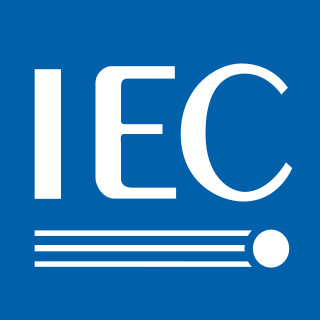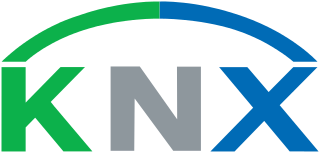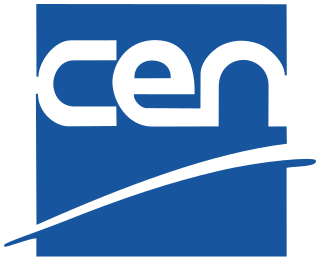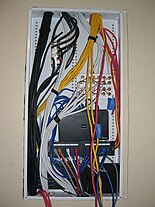
The International Electrotechnical Commission is an international standards organization that prepares and publishes international standards for all electrical, electronic and related technologies – collectively known as "electrotechnology". IEC standards cover a vast range of technologies from power generation, transmission and distribution to home appliances and office equipment, semiconductors, fibre optics, batteries, solar energy, nanotechnology and marine energy as well as many others. The IEC also manages four global conformity assessment systems that certify whether equipment, system or components conform to its international standards.

KNX is an open standard for commercial and domestic building automation. KNX devices can manage lighting, blinds and shutters, HVAC, security systems, energy management, audio video, white goods, displays, remote control, etc. KNX evolved from three earlier standards; the European Home Systems Protocol (EHS), BatiBUS, and the European Installation Bus. It can use twisted pair, powerline, RF, or IP links. On this network, the devices form distributed applications and tight interaction is possible. This is implemented via interworking models with standardised datapoint types and objects, modelling logical device channels.
Power-line communication carries data on a conductor that is also used simultaneously for AC electric power transmission or electric power distribution to consumers.

CENELEC is responsible for European standardization in the area of electrical engineering. Together with ETSI (telecommunications) and CEN, it forms the European system for technical standardization. Standards harmonised by these agencies are regularly adopted in many countries outside Europe which follow European technical standards. Although CENELEC works closely with the European Union, it is not an EU institution. Nevertheless, its standards are "EN" EU standards, thanks to EU Regulation 1025/2012.
LonWorks or Local Operating Network is an open standard for networking platforms specifically created to address the needs of control applications. The platform is built on a protocol created by Echelon Corporation for networking devices over media such as twisted pair, powerlines, fibre optics, and RF. It is used for the automation of various functions within buildings such as lighting and HVAC; see building automation.

The European Committee for Standardization is a public standards organization whose mission is to foster the economy of the European Single Market and the wider European continent in global trading, the welfare of European citizens and the environment by providing an efficient infrastructure to interested parties for the development, maintenance and distribution of coherent sets of standards and specifications.
EN 50090 is a European standard for Home and Building Electronic Systems (HBES) open communications, issued by CENELEC. It covers any combination of electronic devices linked via a digital transmission network to provide automated, decentralised and distributed process control for domestic and commercial and building applications; for example the control of lighting, heating, food preparation, washing, energy management, water, fire alarms, blinds, security, etc.
Fieldbus is the name of a family of industrial computer networks used for real-time distributed control. Fieldbus profiles are standardized by the International Electrotechnical Commission (IEC) as IEC 61784/61158.
Fieldbus Foundation was an organization dedicated to a single international, interoperable fieldbus standard. It was established in September 1994 by a merger of WorldFIP North America and the Interoperable Systems Project (ISP). Fieldbus Foundation was a not-for-profit trade consortium that consisted of more than 350 of the world's suppliers and end users of process control and manufacturing automation products. Working together those companies made contributions to the IEC/ISA/FDI and other fieldbus standards development.
The Spanish Association for Standardization and Certification (AENOR) is an entity dedicated to the development of standardization and certification in all Spanish industrial and service sectors.

The British Standards Institution (BSI) is the national standards body of the United Kingdom. BSI produces technical standards on a wide range of products and services and also supplies certification and standards-related services to businesses.

The European Cooperation for Space Standardization (ECSS) is a collaboration between the European Space Agency (ESA), the European space industry represented by Eurospace, and several space agencies, to develop and maintain a coherent, single set of user-friendly standards for use in all European space activities. Established in 1993 following a call by Eurospace to unify space products assurance standardization on a European level, it was officially adopted by the ESA on 23 June 1994 through the resolution ESA/C/CXIII/Res.1, to replace its own Procedures, Specifications and Standards (PSS) system. The ECSS currently has 139 active standards, forming the ECSS system. These standards cover management, engineering, product assurance, and space sustainability disciplines. The ECSS is managed by the ESA Requirement and Standard Division, based in the European Space Research and Technology Centre (ESTEC) in Noordwijk, the Netherlands. The ECSS maintains connections with multiple European and international standardization organizations, to contribute to standardization and to adopt relevant standards as part of the ECSS system.

The Keymark is a voluntary European certification mark demonstrating compliance with the European Standard (EN). It is owned by CEN, the European Committee for Standardization, and CENELEC, the European Committee for Electrotechnical Standardization.
An SY control cable is a flexible instrumentation electrical cable designed for measuring, control or regulation in the field of process automation. It is a flexible multicore cable, with copper conductors and a galvanised steel wire braid (GSWB) for mechanical protection. The cable is typically manufactured with PVC insulation, bedding and a transparent PVC sheath. The transparent sheath means signs of deterioration, damage or corrosion can be detected with ease.
The Factory Instrumentation Protocol or FIP is a standardized field bus protocol. Its most current definition can be found in the European Standard EN50170.
ISO/IEC JTC 1/SC 25 Interconnection of information technology equipment is a standardization subcommittee of the Joint Technical Committee ISO/IEC JTC 1, of the International Organization for Standardization (ISO) and the International Electrotechnical Commission (IEC), which develops and facilitates standards within the field of interconnection of information technology equipment. The international secretariat of ISO/IEC JTC 1/SC 25 is the Deutsches Institut für Normung (DIN) located in Germany.

Cyprus Organisation for Standardisation or CYS, is the National Standardisation Body of Cyprus, whose principal activity is the production of standards and the supply of standards-related services.
EN 16114 "Management consultancy services" is a standard published by the European Committee for Standardization (CEN) on September 28, 2011. It focuses on the providing of management consulting services by management consultancy service providers (MCSPs).
High-integrity software is software whose failure may cause serious damage with possible "life-threatening consequences." “Integrity is important as it demonstrates the safety, security, and maintainability of… code.” Examples of high-integrity software are nuclear reactor control, avionics software, and process control software.
[H]igh integrity means that the code:








